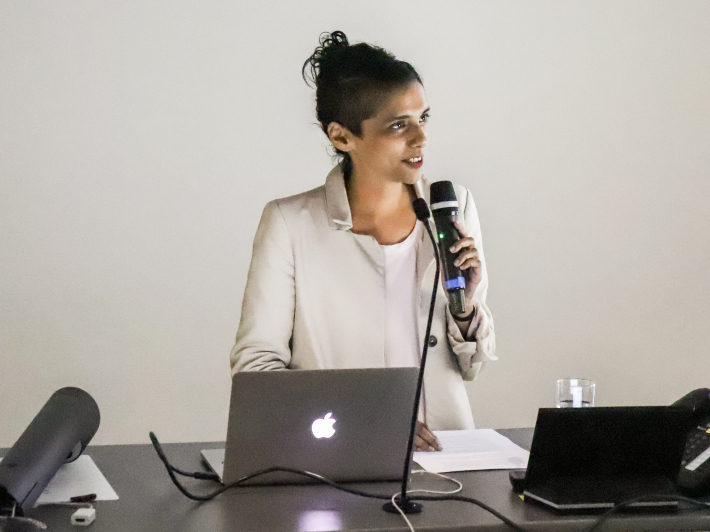Black Atlantis combines two conversations - afrofuturism and the anthropocene. It takes as point of departure Drexciya, the late 20th century electronic music duo from Detroit, and their creation of a sonic, fictional world. Through liner notes and track titles, Drexciya take the Black Atlantic below the water with their imaginary of an Atlantis comprised of former slaves who have adapted to living underwater. This wetness brings to the table a sense of the haptic, the sensory, the bodily, and the epidermal. What below-the-water, and Atlantis brings back is the bottom of the sea, the volume of the water, the materiality of the space of the ocean, and other protagonists that inhabit the sea.
This third installment The End of Eating Everything follows Bodies and Storms// Black Atlantis I; and Agitations and Adaptations// Black Atlantis II. It takes its title from a work by Wangechi Mutu which shows a monstrous form of consumption underwater. The End of Eating Everything considers what Drexciyans might consume underwater, what things are consuming each other around them and what boundaries might be eroded between the what's and the who's of what is being eaten.
Ayesha Hameed lives in London, UK. Since 2014 Hameed's multi-chapter project 'Black Atlantis' has looked at the Black Atlantic and its afterlives in contemporary illegalized migration at sea, in oceanic environments, through Afrofuturistic dancefloors and soundsystems and in outer space. Through videos, audio essays and performance lectures, she examines how to think through sound, image, water, violence and history as elements of an active archive; and time travel as an historical method. Recent exhibitions include Liverpool Biennale (2021), Gothenburg Biennale (2019), Lubumbashi Biennale (2019) and Dakar Biennale (2018). She is co-editor of Futures and Fictions (Repeater 2017) and co-author of Visual Cultures as Time Travel (Sternberg/MIT forthcoming 2021). She is currently Co-Programme Leader of the PhD in Visual Cultures at Goldsmiths University of London.
Ayesha Hameed: The End of Eating Everything is co-hosted by the Wattis Institute and the Graduate Program in Visual & Critical Studies. Organized by Jacqueline Francis, Diego Villalobos, and Kim Nguyen.
About California College of the Arts
Located at the center of innovation and technology in the San Francisco Bay Area, California College of the Arts is home to a world-renowned faculty of practicing artists and entrepreneurs, and a diverse community of makers that are boldly reimagining the world. Offering 22 undergraduate and 11 graduate programs in fine arts, architecture, design, and writing, CCA's creative culture is built around the ideals of interdisciplinary collaboration, sustainability, and community engagement.
California College of the Arts campuses are located in Huichin and Yelamu, also known as Oakland and San Francisco, respectively, on the unceded territories of Chochenyo and Ramaytush Ohlone peoples, who have continuously lived upon this land since time immemorial. We recognize the historic discrimination and violence inflicted upon Indigenous peoples in California and the Americas, including their forced removal from ancestral lands, and the deliberate and systematic destruction of their communities and culture. CCA honors Indigenous peoples--past, present, and future--here and around the world, and we wish to pay respect to local elders, including those of the lands from which you are joining us virtually today. If you are unsure of who's land you are currently residing upon, we encourage you to visit native-land.ca.
show less
This third installment The End of Eating Everything follows Bodies and Storms// Black Atlantis I; and Agitations and Adaptations// Black Atlantis II. It takes its title from a work by Wangechi Mutu which shows a monstrous form of consumption underwater. The End of Eating Everything considers what Drexciyans might consume underwater, what things are consuming each other around them and what boundaries might be eroded between the what's and the who's of what is being eaten.
Ayesha Hameed lives in London, UK. Since 2014 Hameed's multi-chapter project 'Black Atlantis' has looked at the Black Atlantic and its afterlives in contemporary illegalized migration at sea, in oceanic environments, through Afrofuturistic dancefloors and soundsystems and in outer space. Through videos, audio essays and performance lectures, she examines how to think through sound, image, water, violence and history as elements of an active archive; and time travel as an historical method. Recent exhibitions include Liverpool Biennale (2021), Gothenburg Biennale (2019), Lubumbashi Biennale (2019) and Dakar Biennale (2018). She is co-editor of Futures and Fictions (Repeater 2017) and co-author of Visual Cultures as Time Travel (Sternberg/MIT forthcoming 2021). She is currently Co-Programme Leader of the PhD in Visual Cultures at Goldsmiths University of London.
Ayesha Hameed: The End of Eating Everything is co-hosted by the Wattis Institute and the Graduate Program in Visual & Critical Studies. Organized by Jacqueline Francis, Diego Villalobos, and Kim Nguyen.
About California College of the Arts
Located at the center of innovation and technology in the San Francisco Bay Area, California College of the Arts is home to a world-renowned faculty of practicing artists and entrepreneurs, and a diverse community of makers that are boldly reimagining the world. Offering 22 undergraduate and 11 graduate programs in fine arts, architecture, design, and writing, CCA's creative culture is built around the ideals of interdisciplinary collaboration, sustainability, and community engagement.
California College of the Arts campuses are located in Huichin and Yelamu, also known as Oakland and San Francisco, respectively, on the unceded territories of Chochenyo and Ramaytush Ohlone peoples, who have continuously lived upon this land since time immemorial. We recognize the historic discrimination and violence inflicted upon Indigenous peoples in California and the Americas, including their forced removal from ancestral lands, and the deliberate and systematic destruction of their communities and culture. CCA honors Indigenous peoples--past, present, and future--here and around the world, and we wish to pay respect to local elders, including those of the lands from which you are joining us virtually today. If you are unsure of who's land you are currently residing upon, we encourage you to visit native-land.ca.
Black Atlantis combines two conversations - afrofuturism and the anthropocene. It takes as point of departure Drexciya, the late 20th century electronic music duo from Detroit, and their creation of a sonic, fictional world. Through liner notes and track titles, Drexciya take the Black Atlantic below the water with their imaginary of an Atlantis comprised of former slaves who have adapted to living underwater. This wetness brings to the table a sense of the haptic, the sensory, the bodily, and the epidermal. What below-the-water, and Atlantis brings back is the bottom of the sea, the volume of the water, the materiality of the space of the ocean, and other protagonists that inhabit the sea.
This third installment The End of Eating Everything follows Bodies and Storms// Black Atlantis I; and Agitations and Adaptations// Black Atlantis II. It takes its title from a work by Wangechi Mutu which shows a monstrous form of consumption underwater. The End of Eating Everything considers what Drexciyans might consume underwater, what things are consuming each other around them and what boundaries might be eroded between the what's and the who's of what is being eaten.
Ayesha Hameed lives in London, UK. Since 2014 Hameed's multi-chapter project 'Black Atlantis' has looked at the Black Atlantic and its afterlives in contemporary illegalized migration at sea, in oceanic environments, through Afrofuturistic dancefloors and soundsystems and in outer space. Through videos, audio essays and performance lectures, she examines how to think through sound, image, water, violence and history as elements of an active archive; and time travel as an historical method. Recent exhibitions include Liverpool Biennale (2021), Gothenburg Biennale (2019), Lubumbashi Biennale (2019) and Dakar Biennale (2018). She is co-editor of Futures and Fictions (Repeater 2017) and co-author of Visual Cultures as Time Travel (Sternberg/MIT forthcoming 2021). She is currently Co-Programme Leader of the PhD in Visual Cultures at Goldsmiths University of London.
Ayesha Hameed: The End of Eating Everything is co-hosted by the Wattis Institute and the Graduate Program in Visual & Critical Studies. Organized by Jacqueline Francis, Diego Villalobos, and Kim Nguyen.
About California College of the Arts
Located at the center of innovation and technology in the San Francisco Bay Area, California College of the Arts is home to a world-renowned faculty of practicing artists and entrepreneurs, and a diverse community of makers that are boldly reimagining the world. Offering 22 undergraduate and 11 graduate programs in fine arts, architecture, design, and writing, CCA's creative culture is built around the ideals of interdisciplinary collaboration, sustainability, and community engagement.
California College of the Arts campuses are located in Huichin and Yelamu, also known as Oakland and San Francisco, respectively, on the unceded territories of Chochenyo and Ramaytush Ohlone peoples, who have continuously lived upon this land since time immemorial. We recognize the historic discrimination and violence inflicted upon Indigenous peoples in California and the Americas, including their forced removal from ancestral lands, and the deliberate and systematic destruction of their communities and culture. CCA honors Indigenous peoples--past, present, and future--here and around the world, and we wish to pay respect to local elders, including those of the lands from which you are joining us virtually today. If you are unsure of who's land you are currently residing upon, we encourage you to visit native-land.ca.
read more
This third installment The End of Eating Everything follows Bodies and Storms// Black Atlantis I; and Agitations and Adaptations// Black Atlantis II. It takes its title from a work by Wangechi Mutu which shows a monstrous form of consumption underwater. The End of Eating Everything considers what Drexciyans might consume underwater, what things are consuming each other around them and what boundaries might be eroded between the what's and the who's of what is being eaten.
Ayesha Hameed lives in London, UK. Since 2014 Hameed's multi-chapter project 'Black Atlantis' has looked at the Black Atlantic and its afterlives in contemporary illegalized migration at sea, in oceanic environments, through Afrofuturistic dancefloors and soundsystems and in outer space. Through videos, audio essays and performance lectures, she examines how to think through sound, image, water, violence and history as elements of an active archive; and time travel as an historical method. Recent exhibitions include Liverpool Biennale (2021), Gothenburg Biennale (2019), Lubumbashi Biennale (2019) and Dakar Biennale (2018). She is co-editor of Futures and Fictions (Repeater 2017) and co-author of Visual Cultures as Time Travel (Sternberg/MIT forthcoming 2021). She is currently Co-Programme Leader of the PhD in Visual Cultures at Goldsmiths University of London.
Ayesha Hameed: The End of Eating Everything is co-hosted by the Wattis Institute and the Graduate Program in Visual & Critical Studies. Organized by Jacqueline Francis, Diego Villalobos, and Kim Nguyen.
About California College of the Arts
Located at the center of innovation and technology in the San Francisco Bay Area, California College of the Arts is home to a world-renowned faculty of practicing artists and entrepreneurs, and a diverse community of makers that are boldly reimagining the world. Offering 22 undergraduate and 11 graduate programs in fine arts, architecture, design, and writing, CCA's creative culture is built around the ideals of interdisciplinary collaboration, sustainability, and community engagement.
California College of the Arts campuses are located in Huichin and Yelamu, also known as Oakland and San Francisco, respectively, on the unceded territories of Chochenyo and Ramaytush Ohlone peoples, who have continuously lived upon this land since time immemorial. We recognize the historic discrimination and violence inflicted upon Indigenous peoples in California and the Americas, including their forced removal from ancestral lands, and the deliberate and systematic destruction of their communities and culture. CCA honors Indigenous peoples--past, present, and future--here and around the world, and we wish to pay respect to local elders, including those of the lands from which you are joining us virtually today. If you are unsure of who's land you are currently residing upon, we encourage you to visit native-land.ca.
show less
Date/Times:
Online - Virtual Event
5 Upcoming Events
., San Francisco, CA .
The Best Events
Every Week in Your Inbox
From Our Sponsors
UPCOMING EVENTS
Great suggestion! We'll be in touch.
Event reviewed successfully.









